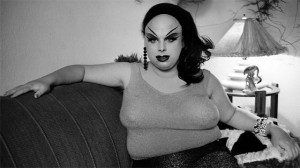
The New Black
The New Black (Saturday, June 29, 1:15pm, Castro Theatre, SF)
Speaking of marriage equality… In 2008, California’s Proposition 8 banning same-sex marriage passed in the same election that sent Barak Obama to the White House, which led some to wonder about the black community’s commitment to equal rights for gays. The mistake in this formulation was to assume that the black community is monolithic. Certainly the argument over the term “marriage” enjoined more than just civil liberties, and for many it was and remains difficult to separate church from state, and freedom of religion from equal rights for all. All of these issues are deftly untangled in The New Black, a must-see documentary that offers unusual access to one black community’s internal struggle with the issue of gay rights. Family members respectfully disagree at back yard barbecues, parishes argue and divide over the issue as the filmmakers follow activists on both sides of Maryland’s 2012 “Question 6,” a referendum on same-sex marriage.
The New Black is the best among several films that tangle with the role religion plays in the lives of America’s queers. The Campaign (Sunday, June 23, 1pm, Castro Theatre, SF) painfully documents the closing months at the No On Prop 8 campaign headquarters in San Francisco’s Castro district. Another film, Lewd & Lascivious (Saturday, June 22, 1:30pm, Victoria Theatre, SF), reveals a little-known episode in queer San Francisco history. Back in the early 1960s, when homosexual congress was against the law in the city, a group of young activist ministers took on the police when they decided to engage the queer community by sponsoring a New Year’s Eve dance for gays and lesbians. Several other films, the great C.O.G. among them, also take on the issue of the wounding nature of religious rejection.

Codebreaker
And Four Dudes
If you want to feel outrage, check out Codebreaker (Tuesday, June 25, 11:30am, Castro Theatre, SF), the story of British mathematician Alan Turing. Famous for “On Computable Numbers,” a theoretical treatise that foresaw today’s computer age, Turing also played a key role in breaking the German Enigma code during World War II, which was crucial to winning the war against the Nazis. Turing was an eccentric genius who wrote about artificial intelligence back when primitive computing machines filled entire buildings. He was always “out” at a time when harsh British laws led to onerous legal charges and, in Turing’s case, to chemical castration. This film, though lushly tarted up like a Merchant Ivory production (half the story is told in dramatic reenactments), will make you seriously pissed off before the final credits role.

Big Joy: The Adventures of James Broughton
The antidote to Codebreaker would be Big Joy: The Adventures of James Broughton (Saturday, June 22, 4pm, Castro Theatre, SF), a glorious, imaginative expression of the poet-filmmaker’s life and work. I have to admit that Broughton is not my cup of tea. I was exposed to his free love epics in the 1980s, when I was still the sharpest of tacks. Seeing the hippie paean The Bed, wherein all possible combos of humans cavort on an iron bed in the middle of a Marin field, gave me the heaves. And I won’t go into the eye gouge impulse brought on by Devotions or Erogeny when they were first thrust upon me by some well-intentioned film teacher intent on sharing the riches of the Bay Area filmmaking tradition. I can’t picture her now, but I am remembering a peasant skirt and the stench of patchouli.
However, I always had an appreciation for Broughton’s earlier works, Mother’s Day in particular, which featured fewer naked body parts and was more formal and poetic. These films were produced when Broughton was living with the soon-to-be-famous movie critic Pauline Kael and was a member of the San Francisco Renaissance, the folks who made the ground fertile for the Beats.
In any case, what recommends this documentary is the way it captures Broughton’s free spirit, propelling itself into flights of visual fancy. The film has a natural flow to it that stays playful throughout in the same way that its subject tried to stay connected to the silly within the serious.

Gore Vidal: The United States of Amnesia
The antidote to Big Joy is a pair of films about literary icons Gore Vidal and Paul Bowles. They are both great, but if I was forced to choose between the two, I would go with Gore. His wit bites as it educates. Gore Vidal: The United States of Amnesia (Wednesday, June 26, 2pm, Castro Theatre), is tremendously well put together, chronicling Vidal’s life through numerous photos and footage of him in his heyday as a T.V. personality. (Vidal famously said, “I never miss a chance to have sex or appear on television.”) He speaks so well for himself that it is difficult to add anything of real value. And that is one of the great assets of United States, the beautiful weaving together of clips of Vidal representing his own ideas in numerous interviews conducted throughout his life. Spending his time sparring with the idea of America and the promise of democracy, Vidal wrote several books, fiction and non, that examined all the great myths of American history and the projection of American power. In the end, he grew pessimistic about our future, saying that Americans “learn nothing because we remember nothing.”
Hopefully, these documentaries, the impulse to make them and the annual desire to see more of them may prove Vidal wrong. Let’s remember where we came from together.
For more festival picks, check out “A Cornucopia of Queerness at the 2013 LGBT Film Fest“.







